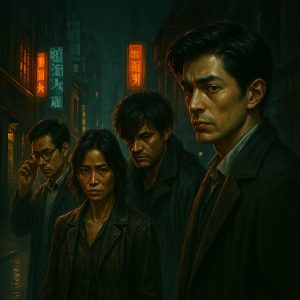 Karma – A Haunting K-Drama That Pulls You In, Then Breaks You Apart
Karma – A Haunting K-Drama That Pulls You In, Then Breaks You Apart
I had high hopes for Karma the moment I saw the trailer. Korean thrillers rarely disappoint me, and this one looked like it was going to dig deep into human desperation and consequence. What I didn’t expect was just how much it would quietly haunt me long after the final episode.
Karma is a six-episode South Korean crime thriller that landed on Netflix with little fanfare—but it didn’t take long to hook me. What begins with a single desperate act quickly unravels into a slow-burning chain reaction that binds six strangers together through secrets, consequences, and irreversible choices.
The premise may sound simple, but this is K-drama storytelling at its finest: layered, emotional, and designed to slowly tighten around your chest until you’re breathless. In many ways, it reminded me of Beyond Evil—not in story, but in tone. Both series thrive on emotional complexity and moral ambiguity, forcing viewers to sit in discomfort as characters make increasingly destructive choices. If you enjoyed Beyond Evil, there’s a strong chance Karma will resonate with you, too.
🔍 The Characters That Drive the Spiral
Park Hae-soo (Season 1 of Squid Game) plays Kim Beom-un, a former petty criminal whose path takes a violent turn. Cold, watchful, and unpredictable—his presence builds tension every time he’s on screen.
Shin Min-a stars as Ju-yeon, a doctor haunted by something traumatic from her teenage years. She’s guarded, fragile, and overflowing with suppressed emotion. Her vulnerability seeps through, even in moments of silence.
Gong Seung-yeon plays Yu-jeong, a former high school queen bee who manipulates people with charm and beauty. She’s frustrating, fascinating, and impossible to trust.
Lee Kwang-soo (The Divorce Insurance on TvN now) is a jittery, unnamed doctor caught cheating, who stumbles into chaos. His nervous energy makes every scene feel raw and unpredictable.
Lee Hee-joon takes on Park Jae-yeong, the desperate debtor whose poor decisions light the match. He’s selfish, reckless, but disturbingly relatable.
Kim Sung-kyun plays Gil-ryong, a quiet Korean-Chinese man whose calm exterior masks a far more dangerous role. His arc hits harder than expected and lingers long after.
🧠 What Worked in Karma
✔️ The tension doesn’t explode—it creeps in gradually. From episode two onward, the weight of each decision becomes more pronounced, drawing you deeper.
✔️ Themes of trauma, regret, and inescapable guilt are woven throughout. They echo through both dialogue and silence, anchoring the emotional core.
✔️ The cinematography mirrors the emotional state of the characters. Cold palettes and close shots create a sense of claustrophobia and pressure.
✔️ The cast is phenomenal. Rather than playing heroes or villains, each actor embraces the grey areas of morality, making their characters painfully real.
🚫 What Fell Short in Karma
❌ Some character motivations aren’t fully explored. A few plot points feel abrupt and could’ve used more buildup.
❌ While the muted visual tone adds to the atmosphere, it occasionally flattens key emotional moments. A more dynamic approach might have elevated the drama further.
🎬 Final Thoughts
Karma doesn’t want you to root for its characters—it wants you to witness their unraveling. If you’re looking for explosions or jaw-dropping twists, this might feel too slow. However, if you love character-driven stories about people pushed past their limits—this series delivers.
It’s not pretty. It’s not hopeful. But it’s honest in its portrayal of human weakness—and the quiet horror of living with the consequences.
By the time the credits rolled, I sat in silence. I needed a moment. It didn’t destroy me, but it definitely unsettled me—and honestly, that’s exactly what I want from a show like this.
Rating: 8.5/10 – A slow-burn thriller that rewards your patience.
If you haven’t seen it already, check out my review of Beyond Evil.